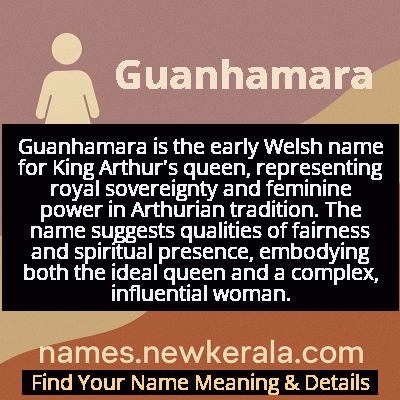Guanhamara Name Meaning & Details
Origin, Popularity, Numerology Analysis & Name Meaning of Guanhamara
Discover the origin, meaning, and cultural significance of the name GUANHAMARA. Delve into its historical roots and explore the lasting impact it has had on communities and traditions.
Name
Guanhamara
Gender
Female
Origin
Arthurian
Lucky Number
4
Meaning of the Name - Guanhamara
Guanhamara is the early Welsh name for King Arthur's queen, representing royal sovereignty and feminine power in Arthurian tradition. The name suggests qualities of fairness and spiritual presence, embodying both the ideal queen and a complex, influential woman.
Guanhamara - Complete Numerology Analysis
Your Numerology Number
Based on Pythagorean Numerology System
Ruling Planet
Uranus (Rahu)
Positive Nature
Strong sense of order, loyal, practical, and disciplined.
Negative Traits
Stubborn, overly serious, rigid, and prone to feeling restricted.
Lucky Colours
Blue, gray.
Lucky Days
Saturday.
Lucky Stones
Blue sapphire.
Harmony Numbers
1, 7, 8.
Best Suited Professions
Managers, engineers, accountants, organizers.
What People Like About You
Dependability, discipline, practicality.
Famous People Named Guanhamara
Guanhamara
Legendary Queen of Arthur
Original Welsh portrayal of Arthur's queen, symbolizing royal sovereignty
Gwenhwyfar
Arthurian Literary Figure
Development of the queen character in Welsh Arthurian tradition
Guinevere
Literary Queen
Evolution into one of Western literature's most complex female characters
Name Variations & International Equivalents
Click on blue names to explore their detailed meanings. Gray names with will be available soon.
Cultural & Historical Significance
Extended Personality Analysis
The personality associated with Guanhamara encompasses the quintessential qualities of Arthurian queenship combined with very human vulnerabilities. She typically exhibits regal composure, intelligence, and a deep sense of responsibility toward her people and position. Her character is marked by emotional depth and passion, qualities that both define her appeal and contribute to her tragic narrative arc. As a diplomatic figure, she demonstrates skill in navigating complex court politics and maintaining the social harmony essential to Camelot's prosperity. However, her most compelling traits emerge in the tension between her public duties and private emotions—her capacity for profound love conflicts with her role as symbol of royal unity. This duality creates a character of remarkable psychological complexity for medieval literature, one who continues to fascinate because she embodies both idealized feminine virtue and very real human failings, making her relatable across centuries of literary interpretation.
Modern Usage & Popularity
In contemporary contexts, Guanhamara remains primarily an academic and historical name, rarely used for children but maintaining significance in Arthurian studies and Celtic cultural revival movements. The more accessible forms like Guinevere and Gwen have seen modest but consistent usage, particularly among parents seeking names with literary or mythological connections. The shortened version 'Gwen' has achieved broader popularity, appearing in various English-speaking countries and benefiting from the trend toward Celtic names. The full Guanhamara form occasionally appears in creative works, historical fiction, and among communities dedicated to Welsh language preservation. Its usage reflects a growing interest in authentic Celtic names rather than their Anglicized versions, though its complexity and unfamiliar pronunciation prevent widespread adoption. The name's survival demonstrates enduring fascination with Arthurian legend and the ongoing relevance of its central female character.
Symbolic & Spiritual Meanings
Symbolically, Guanhamara represents the archetype of the queen whose personal life becomes intertwined with the fate of a kingdom. She embodies the medieval concept of feminine sovereignty—where the queen's virtue and legitimacy were essential to the king's right to rule. The potential meanings of her name ('white phantom' or 'fair lady') create a powerful symbolic duality: she is both the pure, idealized queen and the mysterious woman whose actions have far-reaching consequences. This symbolism extends to her role in the Arthurian cycle, where she represents both the stability of Camelot through her royal marriage and the forces that ultimately undermine it. Her character has become a symbol for the complex relationship between love and duty, personal happiness and public responsibility, making her an enduring figure for exploring how individual choices resonate through larger social and political structures.

